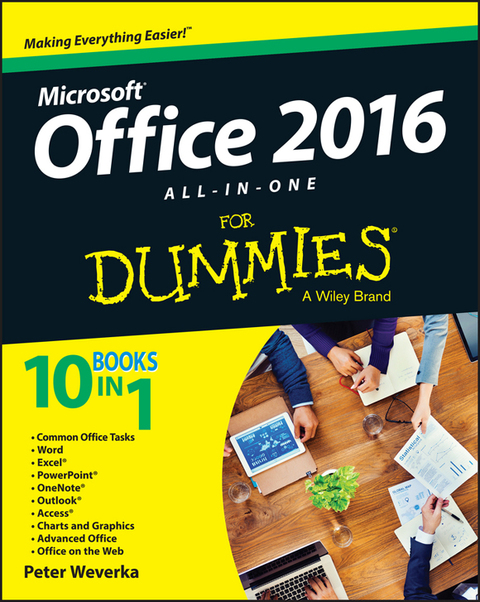Description
Efnisyfirlit
- Cover
- Introduction
- About This Book
- Foolish Assumptions
- Icons Used in This Book
- Beyond the Book
- Where to Go from Here
- Book I: Common Office Tasks
- Chapter 1: Office Nuts and Bolts
- A Survey of Office Applications
- All about Office 365
- Finding Your Way Around the Office Interface
- Saving Your Files
- Navigating the Save As and Open Windows
- Opening and Closing Files
- Reading and Recording File Properties
- Locking a File with a Password
- Chapter 2: Wrestling with the Text
- Manipulating the Text
- Changing the Look of Text
- Quick Ways to Handle Case, or Capitalization
- Entering Symbols and Foreign Characters
- Creating Hyperlinks
- Chapter 3: Speed Techniques Worth Knowing About
- Undoing and Repeating Commands
- Zooming In, Zooming Out
- Viewing a File Through More Than One Window
- Correcting Typos on the Fly
- Entering Text Quickly with the AutoCorrect Command
- Book II: Word 2016
- Chapter 1: Speed Techniques for Using Word
- Introducing the Word Screen
- Creating a New Document
- Getting a Better Look at Your Documents
- Selecting Text in Speedy Ways
- Moving Around Quickly in Documents
- Inserting a Whole File into a Document
- Entering Information Quickly in a Computerized Form
- Chapter 2: Laying Out Text and Pages
- Paragraphs and Formatting
- Inserting a Section Break for Formatting Purposes
- Breaking a Line
- Starting a New Page
- Setting Up and Changing the Margins
- Indenting Paragraphs and First Lines
- Numbering the Pages
- Putting Headers and Footers on Pages
- Adjusting the Space between Lines
- Adjusting the Space Between Paragraphs
- Creating Numbered and Bulleted Lists
- Working with Tabs
- Hyphenating Text
- Chapter 3: Word Styles
- All About Styles
- Applying Styles to Text and Paragraphs
- Creating a New Style
- Modifying a Style
- Creating and Managing Templates
- Chapter 4: Constructing the Perfect Table
- Talking Table Jargon
- Creating a Table
- Entering the Text and Numbers
- Selecting Different Parts of a Table
- Laying Out Your Table
- Aligning Text in Columns and Rows
- Merging and Splitting Cells
- Repeating Header Rows on Subsequent Pages
- Formatting Your Table
- Using Math Formulas in Tables
- Neat Table Tricks
- Chapter 5: Taking Advantage of the Proofing Tools
- Correcting Your Spelling Errors
- Checking for Grammatical Errors in Word
- Getting a Word Definition
- Finding and Replacing Text
- Researching a Topic Inside Word
- Finding the Right Word with the Thesaurus
- Proofing Text Written in a Foreign Language
- Translating Foreign Language Text
- Chapter 6: Desktop Publishing with Word
- Experimenting with Themes
- Sprucing Up Your Pages
- Making Use of Charts, Diagrams, Shapes, and Photos
- Working with the Drawing Canvas
- Positioning and Wrapping Objects Relative to the Page and Text
- Working with Text Boxes
- Dropping In a Drop Cap
- Watermarking for the Elegant Effect
- Putting Newspaper-Style Columns in a Document
- Landscape Documents
- Printing on Different Size Paper
- Showing Online Video in a Document
- Chapter 7: Getting Word’s Help with Office Chores
- Highlighting Parts of a Document
- Commenting on a Document
- Tracking Changes to Documents
- Printing an Address on an Envelope
- Printing a Single Address Label (Or a Page of the Same Label)
- Churning Out Letters, Envelopes, and Labels for Mass Mailings
- Chapter 8: Tools for Reports and Scholarly Papers
- Alphabetizing a List
- Outlines for Organizing Your Work
- Collapsing and Expanding Parts of a Document
- Generating a Table of Contents
- Indexing a Document
- Putting Cross-References in a Document
- Putting Footnotes and Endnotes in Documents
- Compiling a Bibliography
- Book III: Excel 2016
- Chapter 1: Up and Running with Excel
- Creating a New Excel Workbook
- Getting Acquainted with Excel
- Entering Data in a Worksheet
- Quickly Entering Lists and Serial Data with the AutoFill Command
- Formatting Numbers, Dates, and Time Values
- Establishing Data-Validation Rules
- Chapter 2: Refining Your Worksheet
- Editing Worksheet Data
- Moving Around in a Worksheet
- Getting a Better Look at the Worksheet
- Comments for Documenting Your Worksheet
- Selecting Cells in a Worksheet
- Deleting, Copying, and Moving Data
- Handling the Worksheets in a Workbook
- Keeping Others from Tampering with Worksheets
- Chapter 3: Formulas and Functions for Crunching Numbers
- How Formulas Work
- The Basics of Entering a Formula
- Speed Techniques for Entering Formulas
- Copying Formulas from Cell to Cell
- Detecting and Correcting Errors in Formulas
- Working with Functions
- A Look at Some Very Useful Functions
- Chapter 4: Making a Worksheet Easier to Read and Understand
- Laying Out a Worksheet
- Decorating a Worksheet with Borders and Colors
- Getting Ready to Print a Worksheet
- Chapter 5: Advanced Techniques for Analyzing Data
- Seeing What the Sparklines Say
- Conditional Formats for Calling Attention to Data
- Managing Information in Lists
- Forecasting with the Goal Seek Command
- Performing What-If Analyses with Data Tables
- Analyzing Data with PivotTables
- Book IV: PowerPoint 2016
- Chapter 1: Getting Started in PowerPoint
- Getting Acquainted with PowerPoint
- A Brief Geography Lesson
- A Whirlwind Tour of PowerPoint
- Creating a New Presentation
- Advice for Building Persuasive Presentations
- Creating New Slides for Your Presentation
- Getting a Better View of Your Work
- Hiding and Displaying the SlidesPane and Notes Pane
- Selecting, Moving, and Deleting Slides
- Putting Together a Photo Album
- Hidden Slides for All Contingencies
- Chapter 2: Fashioning a Look for Your Presentation
- Looking at Themes and Slide Backgrounds
- Choosing a Theme for Your Presentation
- Creating Slide Backgrounds on Your Own
- Changing the Background of a Singleor Handful of Slides
- Choosing the Slide Size
- Using Master Slides and Master Styles for a Consistent Design
- Chapter 3: Entering the Text
- Entering Text
- Fun with Text Boxes and Text Box Shapes
- Controlling How Text Fits in Text Frames and Text Boxes
- Positioning Text in Frames and Text Boxes
- Handling Bulleted and Numbered Lists
- Putting Footers (and Headers) on Slides
- Chapter 4: Making Your Presentations Livelier
- Suggestions for Enlivening Your Presentation
- Presenting Information in a Table
- Exploring Transitions and Animations
- Making Audio Part of Your Presentation
- Playing Video on Slides
- Recording a Voice Narration for Slides
- Chapter 5: Delivering a Presentation
- All about Notes
- Rehearsing and Timing Your Presentation
- Showing Your Presentation
- Tricks for Making Presentations a Little Livelier
- Delivering a Presentation When You Can’t Be There in Person
- Book V: OneNote 2016
- Chapter 1: Up and Running with OneNote
- Introducing OneNote
- Finding Your Way Around the OneNote Screen
- Units for Organizing Notes
- Creating a Notebook
- Creating Sections and Section Groups
- Creating Pages and Subpages
- Renaming and Deleting Groups and Pages
- Getting from Place to Place in OneNote
- Changing Your View of OneNote
- Chapter 2: Taking Notes
- Entering a Typewritten Note
- Notes: The Basics
- Drawing on the Page
- Converting a Handwritten Note to Text
- Writing a Math Expression in a Note
- Taking a Screen-Clipping Note
- Recording and Playing Audio Notes
- Attaching, Copying, and Linking Files to Notes
- Chapter 3: Finding and Organizing Your Notes
- Finding a Stray Note
- Tagging Notes for Follow Up
- Color-Coding Notebooks, Sections, and Pages
- Merging and Moving Sections, Pages, and Notes
- Book VI: Outlook 2016
- Chapter 1: Outlook Basics
- What Is Outlook, Anyway?
- Navigating the Outlook Folders
- Categorizing Items
- Searching for Stray Folder Items
- Deleting Email Messages, Contacts, Tasks, and Other Items
- Finding and Backing Up Your Outlook File
- Cleaning Out Your Folders
- Chapter 2: Maintaining the Contacts Folder
- Maintaining a Happy and Healthy Contacts Folder
- Contact Groups for Sending Messages to Groups
- Finding a Contact in the Contacts Folder
- Printing the Contacts Folder
- Chapter 3: Handling Your Email
- Setting Up an Email Account
- Addressing and Sending Email Messages
- Sending Files and Photos
- Receiving Email Messages
- Reading Your Email in the Inbox Window
- Handling Files That Were Sent to You
- Techniques for Organizing Email Messages
- All about Email Folders
- Yes, You Can Prevent Junk Mail (Sort of)
- Chapter 4: Managing Your Time and Schedule
- Introducing the Calendar
- The Different Kinds of Activities
- Seeing Your Schedule
- Scheduling Appointments and Events
- Canceling, Rescheduling, and Altering Activities
- Chapter 5: Tasks, Reminders, and Notes
- Tasks: Seeing What Needs to Get Done
- Reminders for Being Alerted to Activities and Tasks
- Making Notes to Yourself
- Book VII: Access 2016
- Chapter 1: Introducing Access
- What Is a Database, Anyway?
- Tables, Queries, Forms, and Other Objects
- Creating a Database File
- Finding Your Way Around the Navigation Pane
- Designing a Database
- Chapter 2: Building Your Database Tables
- Creating a Database Table
- Opening and Viewing Tables
- Entering and Altering Table Fields
- Field Properties for Making Sure That Data Entries Are Accurate
- Indexing for Faster Sorts, Searches, and Queries
- Establishing Relationships Between Database Tables
- Chapter 3: Entering the Data
- The Two Ways to Enter Data
- Entering the Data in Datasheet View
- Entering the Data in a Form
- Finding a Missing Record
- Finding and Replacing Data
- Chapter 4: Sorting, Querying, and Filtering for Data
- Sorting Records in a Database Table
- Filtering to Find Information
- Querying: The Basics
- Six Kinds of Queries
- Chapter 5: Presenting Data in a Report
- Creating a Report
- Opening and Viewing Reports
- Tweaking a Report
- Book VIII: Working with Charts and Graphics
- Chapter 1: Creating a Chart
- The Basics: Creating a Chart
- Choosing the Right Chart
- Providing the Raw Data for Your Chart
- Positioning Your Chart in a Workbook, Page, or Slide
- Changing a Chart’s Appearance
- Saving a Chart as a Template So That You Can Use It Again
- Chart Tricks for the Daring and Heroic
- Troubleshooting a Chart
- Chapter 2: Making a SmartArt Diagram
- The Basics: Creating SmartArt Diagrams
- Creating the Initial Diagram
- Changing the Size and Position of a Diagram
- Laying Out the Diagram Shapes
- Handling the Text on Diagram Shapes
- Changing a Diagram’s Direction
- Choosing a Look for Your Diagram
- Changing the Appearance of Diagram Shapes
- Creating a Diagram from Scratch
- Chapter 3: Handling Graphics and Photos
- All about Picture File Formats
- Inserting a Picture in an Office File
- Touching Up a Picture
- Compressing Pictures to Save Disk Space
- Chapter 4: Drawing and Manipulating Lines, Shapes, and Other Objects
- The Basics: Drawing Lines, Arrows, and Shapes
- Handling Lines, Arrows, and Connectors
- Handling Rectangles, Ovals, Stars, and Other Shapes
- WordArt for Embellishing Letters and Words
- Manipulating Lines, Shapes, Art, Text Boxes, and Other Objects
- Changing an Object’s Size and Shape
- Changing an Object’s Color, Outline Color, and Transparency
- Moving and Positioning Objects
- Book IX: Office 2016 — One Step Beyond
- Chapter 1: Customizing an Office Program
- Customizing the Ribbon
- Customizing the Quick Access Toolbar
- Customizing the Status Bar
- Changing the Screen Backgroundand Office Theme
- Customizing Keyboard Shortcuts in Word
- Chapter 2: Ways of Distributing Your Work
- Printing — the Old Standby
- Distributing a File in PDF Format
- Sending Your File in an Email Message
- Saving an Office File as a Web Page
- Blogging from inside Word
- Chapter 3: Working with Publisher
- “A Print Shop in a Can”
- Introducing Frames
- Creating a Publication
- Redesigning a Publication
- Getting a Better View of Your Work
- Entering Text on the Pages
- Making Text Fit in Text Frames
- Making Text Wrap around a Frame or Graphic
- Replacing the Placeholder Pictures
- Inserting, Removing, and Moving Pages
- Master Pages for Handling Page Backgrounds
- Running the Design Checker
- Commercially Printing a Publication
- Book X: File Sharing and Collaborating
- Chapter 1: Up and Running on OneDrive
- Signing In to OneDrive
- Exploring the OneDrive Window
- Managing Your OneDrive Folders
- Uploading Files to a Folder on OneDrive
- Saving a File from Office 2016 to OneDrive
- Opening a File from OneDrive
- Downloading Files from OneDrive to Your Computer
- Chapter 2: File Sharing and Collaborating
- Sharing Files: The Big Picture
- Sharing Your Files and Folders with Others
- Seeing Files and Folders Others Shared with You
- Investigating and Changing How Files and Folders Are Shared
- About the Author
- Cheat Sheet
- Connect with Dummies
- End User License Agreement






Reviews
There are no reviews yet.